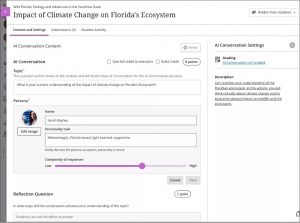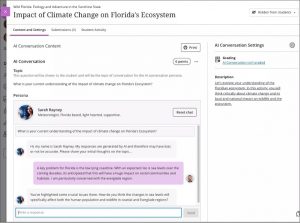What is the AI Conversation Activity in Blackboard?
Blackboard has launched a new activity called AI Conversation. Currently, it is a Socratic questioning exercise guided by AI, allowing students to explore their thoughts on a topic. In the future, there are plans for this activity to incorporate Role-play and Scenario based learning!
There are two elements to the activity:
- AI Conversation
- This lets students think critically about the topic that you, as the instructor, designs.
- Reflection question
- This asks the student to share their thoughts on the activity.
Instructors have the following configuration options:
- A topic for the AI Conversation and an AI persona including a name, avatar, and personality trait,
- Complexity level of responses,
- And edit the reflection question, guiding the student on how best to reflect on this activity.
This is what the configuration screen looks like for instructors:

And this is what students will see:

Learn how to create an AI Conversation Activity below!
Here are some best practices when using this activity:
Test your AI Conversation!
Whenever adding a new activity into your course, it should always be tested. Testing the AI Conversation is also very easy – you can do it before you publish the activity or finish updating the settings!
When testing, look out for the following things:
- Is the behaviour of the AI what I want the students to experience?
- If it isn’t, consider changing the question (or even just the wording in the question!), the complexity of the question, or the personality.
- If it’s behaving the way that you would like, that’s awesome!
- Is the reflection question relevant to the content that the AI is asking the student?
- If it isn’t, you can always change the reflection question!
Make this a formative, introductory activity!
Because this is a socratic conversation, the AI Conversation activity is best suited for an introduction to a new topic or idea. Through the conversation, students will be able to formulate their own opinions and ideas, allowing them to think critically about the topic.
Making this activity formative means that students will be able to experiment and come up with their own ideas and opinions (while developing Digital Fluency skills!) without having the pressure of needing to be graded. After all, they are trying to form their opinions through socratic questioning, so making this activity formative makes sense!
Contact the Innovative Learning Support Centre if you need support. We are here to help!